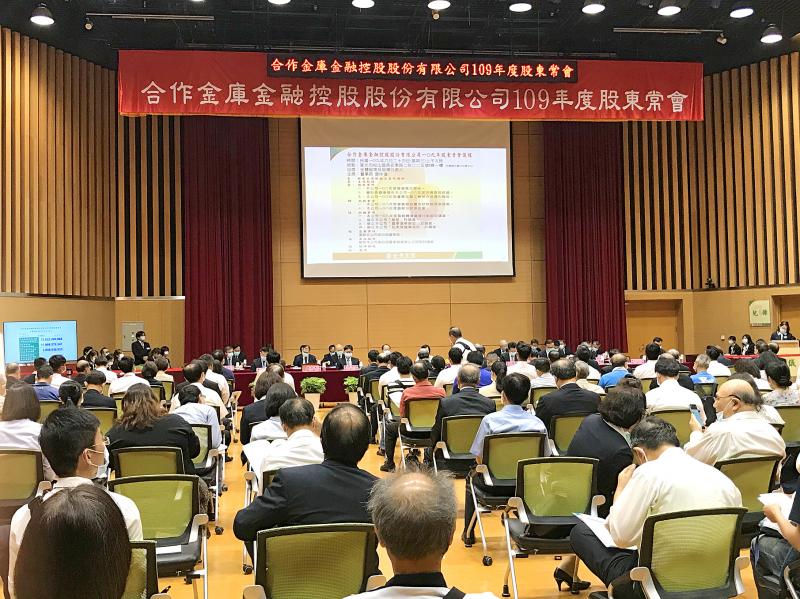State-run Taiwan Cooperative Financial Holding Co (TCFH, 合庫金控) on Wednesday said the operating environment might start to improve in the second half of the year as the worst of the COVID-19 pandemic this quarter is over.
TCFH chairman Lei Chung-dar (雷仲達) made the remarks after the company’s annual general meeting, when government-appointed candidates secured an overwhelming majority on the company’s board, winning 13 of 15 seats.
“The worst impact from the virus outbreak is likely over for Taiwan and things might start to improve going forward,” said Lei, who is also a director on the central bank board, and poised to remain at the helm of the bank-focused conglomerate.

Main subsidiary Taiwan Cooperative Bank (合庫銀行), the nation’s largest lender by number of branches, aims to increase its loan book by 3 percent this year, aided by companies shifting production back to Taiwan from China as well as a recovery in property deals.
The lender, one of Taiwan’s top mortgage operators, posted an 8.5 percent pickup in land financing and another 2.7 percent gain in mortgage lending in the first quarter, compared with a year earlier.
Lei said that people who previously postponed property purchases might start to resume buying after the virus crisis in Taiwan began to wind down late last month.
Government data showed that the housing market from February to last month held resilient with a low single-digit percentage decline compared with the same period last year.
Meanwhile, demand for factory and office space is expected to gain traction from returning companies seeking to diversify manufacturing sites and cope with US-China trade tensions, brokers have said.
Overall, the record low interest rate would lend support to property purchases, Lei said.
There is no need to worry about a property bubble, he said, adding that real demand underpins housing deals these days and the central bank has policy tools such as credit controls to curb speculation.
The boom in domestic tourism is also favorable for consumer banking, Lei told shareholders, as all lenders have offered cash rebates or credit bonuses to customers who use stimulus vouchers to pay for transportation, hotels, restaurant meals, shopping or other recreational expenses.
Shareholders at the meeting approved a proposal to distribute a cash dividend of NT$1.15 per common share.

In Italy’s storied gold-making hubs, jewelers are reworking their designs to trim gold content as they race to blunt the effect of record prices and appeal to shoppers watching their budgets. Gold prices hit a record high on Thursday, surging near US$5,600 an ounce, more than double a year ago as geopolitical concerns and jitters over trade pushed investors toward the safe-haven asset. The rally is putting undue pressure on small artisans as they face mounting demands from customers, including international brands, to produce cheaper items, from signature pieces to wedding rings, according to interviews with four independent jewelers in Italy’s main

Japanese Prime Minister Sanae Takaichi has talked up the benefits of a weaker yen in a campaign speech, adopting a tone at odds with her finance ministry, which has refused to rule out any options to counter excessive foreign exchange volatility. Takaichi later softened her stance, saying she did not have a preference for the yen’s direction. “People say the weak yen is bad right now, but for export industries, it’s a major opportunity,” Takaichi said on Saturday at a rally for Liberal Democratic Party candidate Daishiro Yamagiwa in Kanagawa Prefecture ahead of a snap election on Sunday. “Whether it’s selling food or

CONCERNS: Tech companies investing in AI businesses that purchase their products have raised questions among investors that they are artificially propping up demand Nvidia Corp chief executive officer Jensen Huang (黃仁勳) on Saturday said that the company would be participating in OpenAI’s latest funding round, describing it as potentially “the largest investment we’ve ever made.” “We will invest a great deal of money,” Huang told reporters while visiting Taipei. “I believe in OpenAI. The work that they do is incredible. They’re one of the most consequential companies of our time.” Huang did not say exactly how much Nvidia might contribute, but described the investment as “huge.” “Let Sam announce how much he’s going to raise — it’s for him to decide,” Huang said, referring to OpenAI

The global server market is expected to grow 12.8 percent annually this year, with artificial intelligence (AI) servers projected to account for 16.5 percent, driven by continued investment in AI infrastructure by major cloud service providers (CSPs), market researcher TrendForce Corp (集邦科技) said yesterday. Global AI server shipments this year are expected to increase 28 percent year-on-year to more than 2.7 million units, driven by sustained demand from CSPs and government sovereign cloud projects, TrendForce analyst Frank Kung (龔明德) told the Taipei Times. Demand for GPU-based AI servers, including Nvidia Corp’s GB and Vera Rubin rack systems, is expected to remain high,